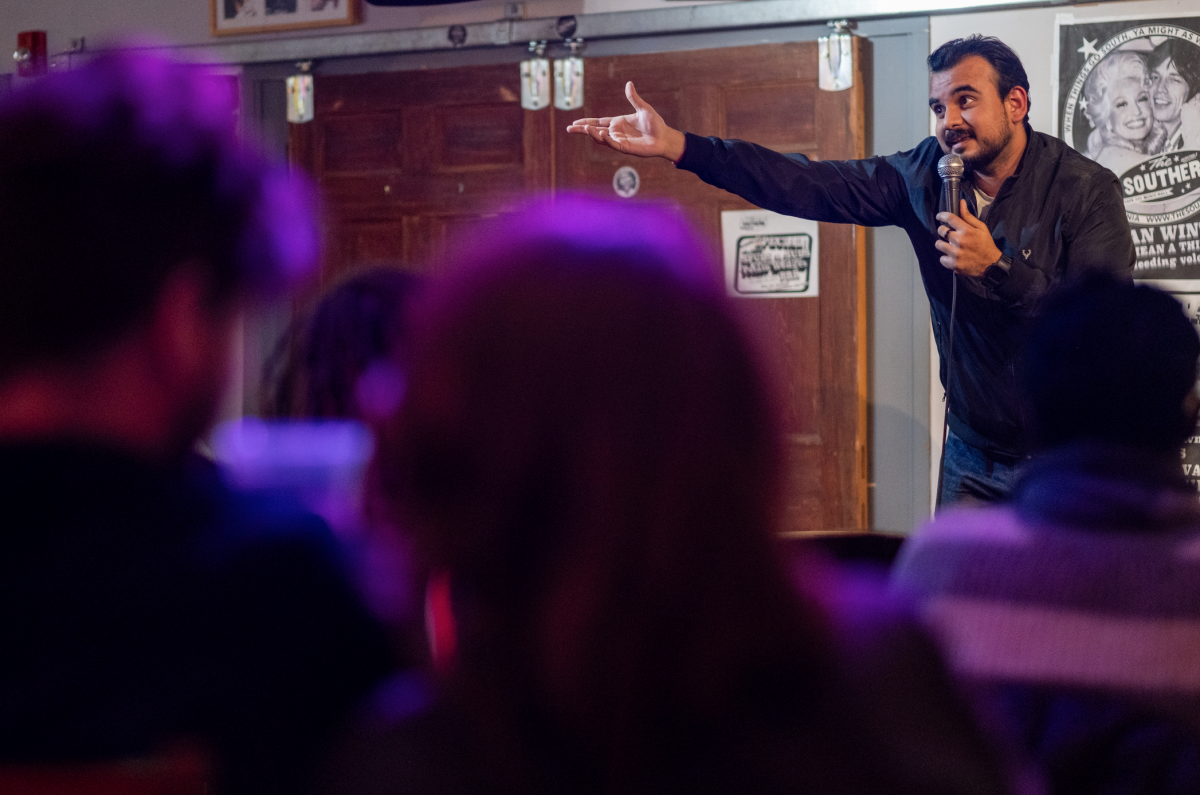A few years ago, Abhishek Kulkarni was just a guy getting a business degree who dabbled in comedy. Now, he’s a local open mic mainstay who’s learned to work a crowd.
“Initially, I was writing a lot of new content for the U.S. audience, so I would go like three weeks of telling the same jokes with subtle variation,” Kulkarni says. “Then I got a handle on what they like … and I started riffing on stage.”
Kulkarni, who’s working on a PhD in business ethics and strategy at UVA’s Darden School of Business, started doing stand-up when he was studying in the U.K. He signed up for a random talent show, told a few jokes, and caught people’s attention. He stuck with it and, when he moved back to Mumbai, fell in with a comedy troupe with a large internet following.
Mumbai had just opened its own outpost of the legendary Comedy Store at the time. When five performers approached Kulkarni about joining them in SNG Comedy, he jumped at the opportunity. The experience gave him exposure to multiple formats: podcasts, improv, skits, and stand-up. Kulkarni traveled around India, opened for the more seasoned SNG funnymen, and studied comedy writing.
“Initially, it was very much about getting the joke right,” Kulkarni says. “Usually, when the comedian first writes a joke, it’s not funny.”
Since the early days, Kulkarni’s evolved as a comedy student, dissecting setups and punchlines like business researchers dissect regressions and spreadsheets. It’s no wonder that in 2023 he decided to build on his MBA and find a PhD program where he could dig deep into ethics and strategy research.
What brought him to Darden’s newly relaunched program is laughable. He knew he needed experience to get into a top-flight U.S. university, so he signed on as a research associate at the Indian School of Business. One day he was sitting alone reading Meditations by Marcus Aurelius. A professor walked by and struck up a conversation. The two shared an interest in stoic philosophy and the discussion came around to Kulkarni’s pursuit of a doctorate. The professor told him about Darden restarting its PhD track, and Kulkarni looked into it. The program offered him a chance to pursue all his interests—strategy, ethics, and entrepreneurship—and moved quickly to the top of his list. He applied and was accepted.
“After I got the admissions letter and had the offer in hand, I went to search for this professor,” Kulkarni says. “I could not find this man. I described him to people; I went to the admissions office and told them what he looked like. They said, ‘There is no such person.’”
Since coming to Charlottesville, Kulkarni has scarcely missed a Monday open mic at The Southern Café and Music Hall. He still gets easy laughs for his faux naiveté as an Indian in the United States, but his comedy’s come of age since he started taking on current events and plying the improv chops he learned with SNG. On a recent night, he overheard a young lady in the front row say he was cute and joined the conversation. “You know this is not a TV screen,” he quipped. “But I am very happy you find me cute.”
During the now infamous Biden-Trump debate week, Kulkarni riffed on the candidates’ sophomoric golf dustup: “I was like, ‘First of all, how is this a conversation about vitality? Golf is not a measure of vitality. It’s not even a sport; you use a tiny vehicle to get around.”
Kulkarni finds this kind of humor works well in Charlottesville.
“Honestly, the audience here is just ripe for comedy,” he says. “There have been some cities where I’ve performed where you have to dumb down certain jokes—like, these are the three topics they laugh at. Charlottesville is not one of those places. They enjoy a vulgar joke as much as high-brow comedy.”
As Kulkarni’s comedy has changed, so have his research interests. He’s still fine-tuning his doctoral thesis topic, but it will almost certainly have a humorous edge. One promising avenue? Examining the humor in the show “Shark Tank,” where famous investors decide whether to give an entrepreneur money if they like the pitch. He’s gone through countless episodes of the show, cataloging jokes, how they’re made, and how they’re received. He’s still crunching the numbers, but one takeaway: Jokes are effective in business, but only in the right context.
Kulkarni hopes he’ll be doing comedy for a long time, but not as a professional. There’s too much pressure in entertaining and generating content for a living. He envisions himself as a respected business professor sprinkling lectures with laughs. More than the gratification a performer gets cracking up an audience, lecturers with a human touch are the most likely to reach students—or so Kulkarni finds from his own experience on the other side of the classroom. “I want students to feel like a participating audience in one of my shows rather than [like they’re] being talked at,” he says.
To keep performance a part of his life, Kulkarni thinks he might one day open a comedy club of his own. Who knows? Maybe after he’s well established, he’ll start an open mic for young entertainers, giving them a place to make bad jokes, then make them better, and eventually figure out what the hell they’re doing.
